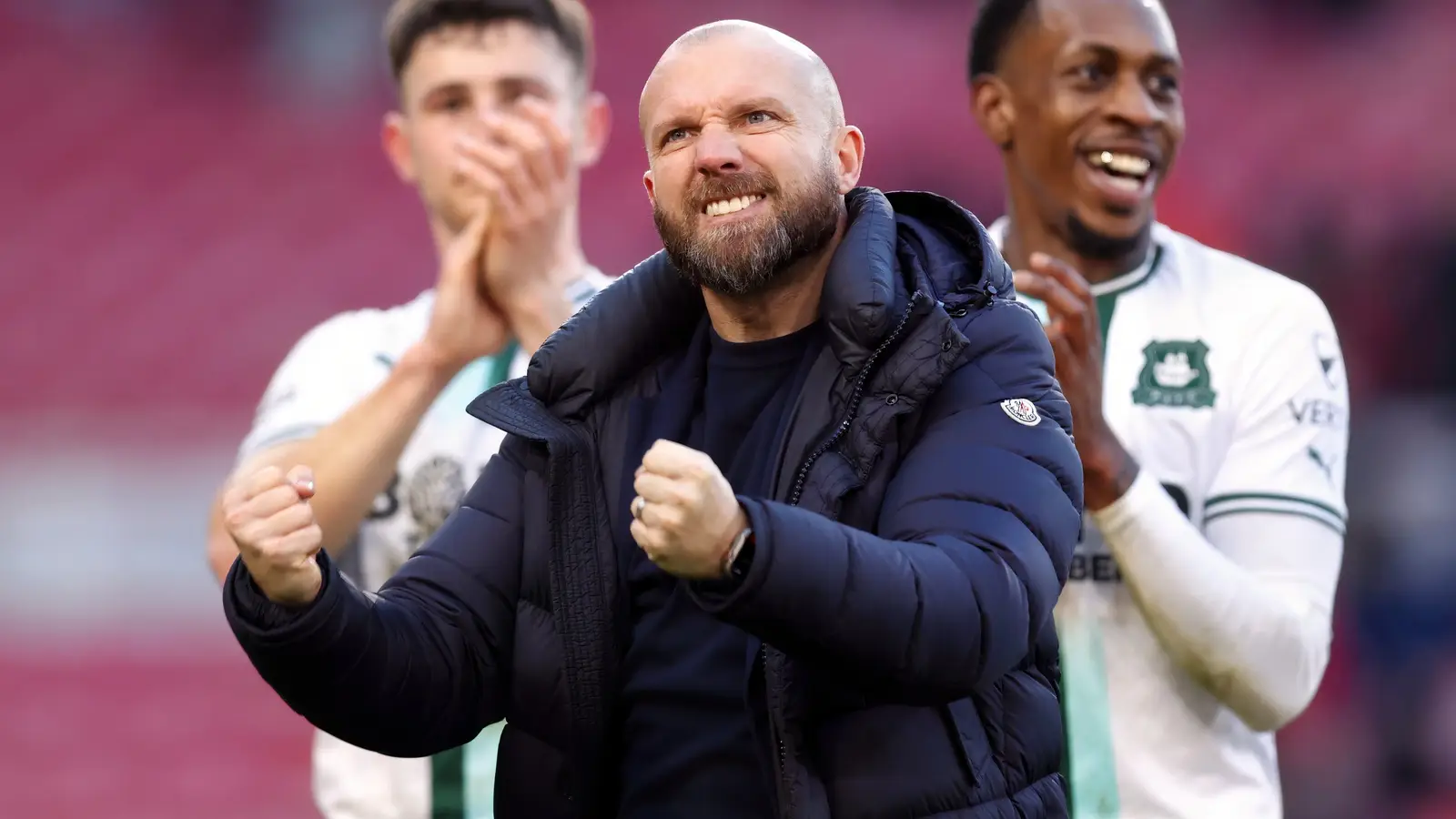Copyright GIVEMESPORT

Ian Foster is ready to return to work after 18 months out of the game following his departure from Plymouth Argyle in April 2024. The highly-regarded 48-year-old spent three years managing various England youth teams and won the 2022 Under-19 Euros before leaving his post to become Steven Gerrard’s assistant at Al-Ettifaq in Saudi Arabia. Just six months later, Foster was offered the head coach role at Plymouth. With Argyle battling relegation, it was a challenging job to take on mid-season and Foster was relieved of his duties after 89 days following a run of one win in 11 Championship games. Foster has used his brief spell at Home Park as a learning curve and believes it’s made him a better manager. “I’ve had time to reflect,” said Foster, speaking exclusively to GiveMeSport. “When I left Plymouth in April, I knew I wouldn’t get straight back into work due to the time of year. I sat down with some coaches I trust and my family and told them I wanted to use this opportunity to study the game. It’s the first prolonged period I have been out of work. By summer last year, some offers started to come in, but my priority was to focus on my own development. “It's now been over a year, but the time has flown by. I think I have used it really productively. I have watched a lot of matches I usually wouldn’t have time to – and at all levels and in different countries – and studied various trends of the game. I haven’t just looked at the Premier League because I know my next role won’t be as a coach there. Now I feel fresh and ready for my next job.” Foster has a Diploma in Football Management from the University of Liverpool and enjoys analysing football academically. He has been influenced by former Nottingham Forest and Swansea City coach Steve Cooper, who he worked with at The Football Association. Cooper’s former Swansea assistant, Mike Marsh, also worked alongside Foster with England Under-17s having been Brendan Rodgers number two at Liverpool between 2012 and 2015. “Steve Cooper and Mike Marsh are two excellent coaches I have worked with and learned from,” said Foster. “Mike is somebody I've known since childhood, and we also played together at Kidderminster. He's has just come back from a stint in Turkey working as Ole Gunnar Solskjaer’s assistant at Besiktas. Mike is a real student at the game. He's also a cantankerous, moody old sod, and he won't mind me saying that! I call him that to his face all the time. But he’s an outstanding coach and tactician, and we constantly challenge each other. We've had each other in headlocks on the pitch at times, talking about how certain scenarios might play out. I have always said he’s someone I want to work with again. “Steve has done great things at Swansea and Nottingham Forest and I was part of his coaching staff as England won the Under-17 World Cup in 2017. We spoke recently about his new role in Denmark with Brøndby. He wanted to try a different experience in a new country, and I understand that. It’s why I went to Saudi Arabia. I like the fact that Steve's taken the plunge. He can hopefully go and win a title there and qualify for European football.” Foster’s adaptable player-led philosophy Foster does not have a rigid philosophy, preferring instead to tailor his methods to individual squads. He also places heavy emphasis on areas where his teams can find marginal gains, including throw-ins. This is something former Stoke City boss Tony Pullis made commonplace, but not necessarily fashionable, a decade ago. Yet current Premier League managers like Sunderland’s Regis Le Bris, Crystal Palace’s Oliver Glasner and Brentford’s Keith Andrews are suddenly making the approach more popular or at least normalised. “From the games I have studied, we are seeing both the long-ball and throw-in used more effectively,” said Foster. “When I was at The FA [with England’s youth teams], I worked an awful lot on throw-ins. They are the most used restart in the game and traditionally not practiced enough. If you get throw-ins right, you have more opportunities to keep the ball and even launch it into the box. It’s obvious the top teams are now starting to invest more time and resource in this area. “And I have also noticed that the kick-off is being used more creatively. If I had told our central midfielder at Plymouth to just lump the ball as far as he can and then attack the space, I am not sure it would have been well received. But when Luis Enrique’s Paris Saint-Germain side do it, people think it’s a genius move, and over time the practice becomes a trend. “Football is always changing and that’s why I don’t tend to overthink my philosophy. As a manager, I believe in prioritising adaptability instead. I first look at the main characteristics of my players and then fit my tactics to their needs. If you look at Pep Guardiola, he has rolling fullbacks who invert into central midfield. But how many teams in world football can effectively copy that? If that’s not the strength of the full-backs at your disposal, you have to use them differently even if, in a perfect world, you’d love them to play that way. “I am a very flexible coach, and some of that comes from my time at The FA where I had a brand-new squad almost every season to work with. One year, I had Cole Palmer, Noni Madueke and Morgan Rodgers in the team, and it was about building chemistry between the trio upfront. Yet very quickly, players like that tend to end up with the Under-21s or senior team, and you have to rethink your tactics or identity. "Another season, I had Levi Colwill and Jarrell Quansah, allowing me to build a solid defensive base. I’d look at them and think, ‘Oh my goodness, these two could be an England partnership for many years to come’. They are both top characters, athletic and capable with both feet. They bring pace, energy and balance, so it was a dream partnership. “There was an element of all England teams trying to play ‘the England way’ and therefore mirroring each other. This was especially true when Dan Ashworth and Matt Crocker were at The FA, but no one ever told us to stick to a specific formation. There was always freedom to adapt to the needs of our players.” Foster's approach was evident as his England side won the Under-19s Euros in 2022, beating Israel 3-1 in the final after extra-time. Quansah, Liam Delap, Jamie Gittens, Carney Chukwuemeka and Alex Scott all formed part of his squad. Chukwuemeka, who is now at Dortmund after leaving Chelsea, scored three goals at the tournament and also made the team of the tournament. “We had an amazing group of staff and players and created a fun culture to work in, which proved key to our victory,” said Foster. “This was important because tournament football is tough. We called the Under-19 Euros ‘Project Believe’ because we wanted the players to back themselves. “In truth, it probably wasn’t our strongest squad in that age group. For example, Jude Bellingham was already a senior England international. And perversely, it actually helped us that we were based in one of the worst places in Slovakia. The hotel was like a throwback to something out of a 1980s sitcom, and the training pitches were not ideal either. “We beat a strong Italy side in the semi-finals. And then in the final against Israel, we fell behind, but had the mental resilience to come back and win the game. Both our starters and substitutes – or ‘finishers’ as we called them – played their part. Carney [Chukwuemeka], who started the game, made it 2-1 in extra-time and Aaron Ramsey [currently on loan at Leicester City] came off the bench to seal the win. The fresh legs of Liam [Delap] helped create that third goal. "The group got what they deserved. It was a fantastic victory. And it was special for me to lift that trophy five years after also winning the Under-17 World Cup when working under Steve Cooper.” Patience With Cole Palmer Paid Off Another player Foster helped develop with England was Cole Palmer. The Chelsea playmaker was part of Cooper’s Under-17s Euros squad in 2019. Palmer had only just turned 16 at the time and there were some at Manchester City who wanted to release him due to concerns over his physical development. Jason Wilcox, now the Manchester United sporting director, fought to keep him at the club, and it didn't take long for Palmer's potential to become apparent. Palmer would go on to move to Chelsea for £42.5m in summer 2023 and has now scored 45 goals and got 29 assists in just 101 appearances for the Blues. “We had to be really patient with Cole,” admitted Foster. “Physically, he was a late developer, and he kept getting injuries and niggles as he was growing. At the 2019 Under-17 Euros in Ireland, we played the Netherlands in the group stage and there is a picture of Cole next to Brian Brobbey, who is now at Sunderland. There is such a contrast. It just shows you the huge difference in that age group between an early and a late developer. Brobbey’s thigh is basically the same size as Cole! “Cole is so easy to work with, though. He’s a lovely, humble kid. He’s so authentic. At Manchester City, he was up against players like Phil Foden, Kevin De Bruyne and Bernardo Silva for minutes, so he had to be patient and mentally strong. He is wonderfully gifted, and he’s obviously taken his chance at Chelsea from day one. It was a brave move to make and one that has clearly paid off.” Foster Prepared To Take Unorthodox Route to EPL Much like he was with Palmer, Foster is prepared to be patient with his own coaching journey, knowing he’s unlikely to end up in the Premier League overnight. And the former Kidderminster striker is prepared to take a few risks in order to further strengthen his CV. “I wasn’t a superstar footballer,” said Foster, who scored 37 goals in 164 games during two spells with Kidderminster. “I was just okay and as a result, the pathway to get where I want to be might take longer. That’s just the nature of the game. If I had played 500 Premier League games, or had 100 caps for England, my route to become a Premier League manager might have come sooner. So I have to get as many experiences as I possibly can, including being open to different and even unorthodox opportunities.” Leaving the Football Association for Saudi Arabia to become Gerrard’s assistant at Al-Ettifaq in July 2023 was certainly one example of this. That summer, Saudi Pro League clubs signed almost 100 foreigners, and Al-Ettifaq landed Jordan Henderson from Liverpool. But Foster’s new gig also came with some cultural and infrastructural challenges. “When I left The FA, I was with the Under-20s and we had just been knocked out of the World Cup by Italy via a late penalty. I had kind of hit a glass ceiling. So I thought to myself, I need to leave and become a head coach in club football. I had a really honest conversation with The FA after that tournament in Argentina and they said they'd support me in whatever I decided to do next. Then out of the blue I got a phone call from Steven Gerrard asking me if I fancied coming to Saudi Arabia. Steven and I grew up not too far away from one another and we played for the same grassroots team as kids. “The Saudi Pro League is such an ambitious league, but I remember saying to Steven after a couple of months that no one will ever quite understand the job that we've done. When we arrived at Al-Ettifaq, there was no infrastructure. We didn't even have a proper training pitch. Our office was in a sports hall. We didn't have anywhere to eat. You name it, and we probably didn’t have it. But that’s why we were brought into the club, to transform it on and off the field, not just try to win games. We started with nothing, but in fairness to the club, they backed us. "It’s a bit like the famous Kevin Costner line in Field of Dreams, ‘If you build it, they will come’. The only difference is the Saudis did it the other way around: First, they brought people over and then used us to help build their project. “It was rewarding but also very different working out there. The Saudis are nocturnal creatures. We used to fly back from evening games and get home at about three in the morning, and everywhere would still be open. You could do anything in the middle of the night – grab a coffee or even change your car tyres! “We knew we couldn’t just adopt a European way of training. And you have to be mindful of prayer times, which change as the year progresses. So we would adjust training times every few weeks. These were not things I necessarily envisaged when I took the job. But the ambition of the league is so impressive, and I think it will improve season-on-season. “When you hire someone of Steven’s calibre, you also get all his contacts. He has incredible pull, and that’s how we were able to get Jordan, who, let’s not forget, was Liverpool captain at the time. But you still buy-in from the Ministry of Sport and ultimately the budget to pull off a big signing. "In many ways, it was quite frustrating for a player like Jordan to move from Liverpool into an environment where, from a facility standpoint alone, it was quite alarming. But there was a commitment from the club to address our areas of concern. I still speak to people at the club now, and it’s ‘night and day’ from when we first took over. Overcoming these hurdles has only diversified my CV. Going to Saudi wasn’t the route I thought I’d take, but I am certainly glad to have had the experience. Sometimes it helps to operate out of your comfort zone.” Foster only stayed in Saudi Arabia for six months before getting the Plymouth job, replacing the sacked Michael Schumacher in January 2024. He had almost no time to prepare for the role. Just a day after he was appointed, Plymouth beat Sutton United in the third round of the FA Cup, and Foster also managed seven points from his first three league games. But just one win in 11 Championship games would follow, and he was sacked on April 1 after a 1-0 home defeat to Bristol City which left Argyle 21st in the Championship, just one point above the relegation zone. “When I got the Plymouth call, it was a bit of a surprise,” said Foster. “I had come back to England during the festive period with only hand luggage because I was expecting to go back to Saudi in early January, and my son had school then. I was expecting to stay at Al-Ettifaq for three or four years and the Plymouth job wasn't even something I had I applied for. “Steven [Gerrard] was very understanding and so my exit from Al-Ettifaq happened very fast. When I first started at Plymouth, I didn’t have anything with me – not even a pair of football boots because they were still in Saudi! “It was pretty crazy going from the Saudi Pro League to the Championship in a six-month period, and I entered the job with Plymouth in the middle of a relegation battle. I signed for the club around ten at night on a Friday and by Saturday I was in the dugout for the FA Cup game against Suttob at Home Park. I didn't want to be in the stand for it because I thought I'd learn far more about the players standing on the touchline. “I knew going in it was likely to be a tough season. I wasn’t as prepared as I would have liked to have been with staffing due to the whirlwind nature of the appointment, but it was the opportunity I’d been waiting for my whole career, so I felt like I couldn’t turn it down. “In the last 18 months, I've reflected on my time at Plymouth and naturally there are things I wish I had done differently. But there's also things I'm really proud of. If you look at where the club are now [relegated to League One the season after Foster left], I don't think I need to say too much. And we lost three key loanees right at the start of the year. Aston Villa recalled Kaine Kesler-Hayden and Finn Azaz. And Luke Cundle, who had scored give goals for Plymouth, went back to Wolves so he could join Stoke on loan. "I've sat down with my coaches and looked at all the data and I take pride in the fact we avoided relegation during my season there. We just hit a bad run of form, and we all know modern football is cut-throat even though I was brought in with a long-term project in mind. "I think the problem as a manager is sometimes you are judged on your first high-profile head-coach role or big break. I have so many great and successful experiences in a 17-year coaching career, yet some people might only look at my time at Plymouth Argyle. As a coach, you have to be mentally strong and, as importantly, make people aware of the real narrative, including how difficult the role at Plymouth actually was. Over the course of the last 18 months, I've just worked really, really hard on my own personal development to make sure that learnings from my time at Plymouth will benefit my next employer.” Foster is not expected to remain out of football for long. His unique journey, and impressive time with The FA, has already caught the attention of multiple clubs, both in England and abroad. Yet Foster has been intentionally picky about his next job, having never lost faith that the next step in his career will be worth the wait. “If I get a phone call this afternoon, I'm ready to go,” said Foster. “I'm desperate to roll my sleeves up, get my boots on and get going, but the role has to be the right one. “I think it's always important to have that Northern Star. It gives you purpose. Of course, my dream is to one day be a head coach in the Premier League. But in order to get there, I've got to work so hard and believe that one day it's possible. And it's never going to be a linear journey. I'm resilient enough to take the knocks and go again. I have a capable team around me, which gives me the belief that I can one day get there. I feel in a really strong position to return to the dugout refreshed and a better coach than ever.”



